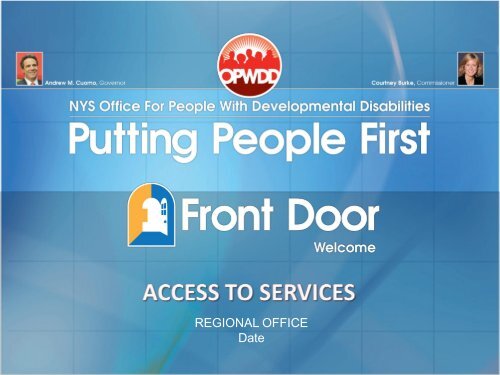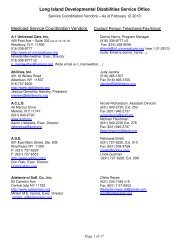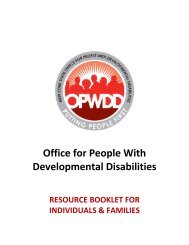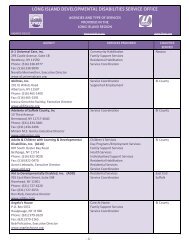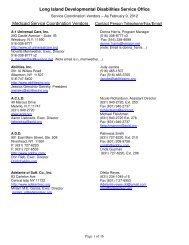Self-Directed Services
Self-Directed Services
Self-Directed Services
You also want an ePaper? Increase the reach of your titles
YUMPU automatically turns print PDFs into web optimized ePapers that Google loves.
REGIONAL OFFICE<br />
Date
TRAINING OBJECTIVES<br />
At the end of the training, you will walk away with<br />
an understanding of:<br />
The mission and purpose of OPWDD<br />
The process to become eligible for supports and<br />
services<br />
What types of supports and services are available<br />
Where you can go to get assistance<br />
2
OPWDD - Who Are We?<br />
The NYS agency responsible for coordinating<br />
services to 126,000+ New Yorkers with intellectual<br />
and developmental disabilities.<br />
The NYS agency responsible for certifying and<br />
overseeing approximately 800 voluntary agency<br />
providers.<br />
A provider of residential/day services for a small<br />
percentage of people served.<br />
3
DDRO MAP<br />
4
DDSOO MAP<br />
5
OUR MISSION<br />
OPWDD helps people with<br />
developmental disabilities live<br />
richer lives.<br />
6
OUR VISION<br />
People with developmental disabilities have a<br />
chance to…<br />
enjoy meaningful relationships with friends,<br />
family and others in their lives<br />
experience personal health and growth<br />
live in the home of their choice<br />
fully participate in their communities<br />
7
OUR PRINCIPLES<br />
Put the person first<br />
Maximize opportunities<br />
Promote and reward excellence<br />
Provide equity of access<br />
Nurture partnerships and collaborations<br />
Require accountability and responsibility<br />
8
OPWDD MISSION & SELF-DETERMINATION<br />
<strong>Self</strong>-Determination is a philosophy that is<br />
based on:<br />
AUTHORITY<br />
FREEDOM<br />
SELF-ADVOCACY<br />
SUPPORT<br />
RESPONSIBILITY<br />
9
OPWDD’s CHALLENGE AND COMMITMENT:<br />
To provide appropriate supports and services to individuals during a<br />
difficult national fiscal crisis.<br />
To ensure that our current supports and services meet the needs of<br />
individuals and families coming into our service system.<br />
To comply with recent federal decisions involving Olmstead and the<br />
Americans With Disabilities Act (ADA) to ensure that the services are<br />
provided in the most integrated, community settings possible.<br />
10
OUR RESPONSE<br />
OPWDD has developed a process for accessing<br />
Individual and Community Supports (ICS) that<br />
is designed to provide more flexibility and<br />
authority for individuals and families in<br />
choosing the supports and services that best<br />
meet their needs.<br />
11
ACCESSING OPWDD SERVICES<br />
Eligibility<br />
Determination<br />
Assessment<br />
of Strengths,<br />
Needs &<br />
Preferences<br />
Support Needs<br />
Identified<br />
Informed<br />
Decision<br />
Making and<br />
Individualized<br />
Plan<br />
Development<br />
Service<br />
Authorization<br />
and<br />
Implementation
ELIGIBILTY<br />
Assessment<br />
of Strengths,<br />
Needs &<br />
Preferences<br />
Eligibility<br />
Determination<br />
Support Needs<br />
Identified<br />
Informed<br />
Decision<br />
Making and<br />
Individualized<br />
Plan<br />
Development<br />
Service<br />
Authorization<br />
and<br />
Implementation
THE ELIGIBILITY DETERMINATION PROCESS<br />
Let’s outline the 3-Step Eligibility Determination<br />
Process and describe the type of information<br />
OPWDD will need to determine that an individual<br />
is eligible for OPWDD services.<br />
15
3 STEPS IN DEVELOPMENTAL DISABILITY<br />
ELIGIBILITY DETERMINATION<br />
1st Step<br />
Review<br />
•DDRO clinical staff review the eligibility request to determine<br />
eligibility.<br />
2nd Step<br />
Review<br />
•If eligibility request is forwarded for a 2nd Step Review, a<br />
committee of DDRO clinicians evaluate the referral materials<br />
and any additional information that has been provided by the<br />
person.<br />
3rd Step<br />
Review<br />
•3 rd Step Reviews are done by an independent Eligibility<br />
Review Committee of licensed practitioners not involved in<br />
the 1 st and 2 nd Step Reviews.<br />
16
REQUIRED DOCUMENTS<br />
Psychological reports which<br />
include an assessment of<br />
intellectual functioning (“IQ<br />
test”)<br />
For conditions other than<br />
Intellectual Disability, a medical<br />
or specialty report that includes<br />
health status and diagnostic<br />
findings to support the qualifying<br />
diagnosis<br />
A recent general medical<br />
assessment report should be<br />
included in all eligibility requests<br />
A developmental/psychosocial<br />
history report, or other report<br />
that shows that the person<br />
became disabled before age<br />
22 (this is required for all<br />
eligibility requests)<br />
Adaptive behavior functioning<br />
assessment<br />
In some cases, the DDRO may<br />
require additional information<br />
to determine eligibility<br />
17
MEDICAID AND HCBS WAIVER ELIGIBILITY<br />
Many services are available from OPWDD and agencies in the OPWDD<br />
system.<br />
Most OPWDD services are provided through the Home and Community<br />
Based <strong>Services</strong> (HCBS) Waiver, which requires Medicaid eligibility and<br />
enrollment.<br />
OPWDD requires individuals to enroll in the right type of Medicaid<br />
coverage for the services they need.<br />
Often, individuals need to enroll in both Medicaid (MA) and HCBS Waiver.<br />
Medicaid Service Coordination (MSC) and/or OPWDD resources are<br />
available to help individuals and families work through these eligibility<br />
processes.<br />
18
NEXT STEPS…<br />
Once eligibility has been determined,<br />
the DDRO will direct you to an<br />
Assessment Specialist to initiate the<br />
assessment process.<br />
19
ASSESSMENT<br />
Eligibility<br />
Determination<br />
Assessment of<br />
Strengths,<br />
Needs &<br />
Preferences<br />
Support Needs<br />
Identified<br />
Informed<br />
Decision<br />
Making and<br />
Individualized<br />
Plan<br />
Development<br />
Service<br />
Authorization<br />
and<br />
Implementation
Why Is Assessment Important?<br />
The purpose of doing an assessment is to<br />
determine a person’s current strengths, needs<br />
and the natural/community supports available<br />
to that individual. This information will then be<br />
used to identify additional service needs and<br />
develop a person-centered plan.<br />
21
Preparing for the assessment can be helpful. Start<br />
thinking about or have the following information<br />
available:<br />
Your strengths<br />
Goals you want to achieve<br />
Changes you would like to make<br />
in your life<br />
Areas where you need help or<br />
assistance to complete everyday<br />
activities<br />
Medical history<br />
How often you see<br />
medical/behavioral professionals<br />
(e.g. doctor, psychologist, speech<br />
therapist)<br />
Supports you have now (e.g.<br />
family, friends)<br />
Cognitive, sensory , motor and<br />
communication needs<br />
22
IDENTIFYING NEED<br />
Eligibility<br />
Determination<br />
Assessment of<br />
Strengths,<br />
Needs &<br />
Preferences<br />
Support<br />
Needs<br />
Identified<br />
Informed<br />
Decision<br />
Making and<br />
Individualized<br />
Plan<br />
Development<br />
Service<br />
Authorization<br />
and<br />
Implementation
MEDICAID SERVICE COORDINATION<br />
Assists with the arrangement, coordination, monitoring, and<br />
evaluation of supports and services to meet an individual’s<br />
needs.<br />
Service Coordination is about helping people with<br />
developmental disabilities live successful lives in the<br />
community according to their own dreams and desires.<br />
25
SERVICE CATEGORIES<br />
OPWDD services fill the gap between existing<br />
natural and community supports.<br />
The services an individual can receive are split into<br />
two categories:<br />
1. SUPPORTS RELATED TO WHERE YOU LIVE<br />
2. SUPPORTS RELATED TO SERVICES YOU RECEIVE<br />
26
GENERAL SUPPORTS MAY INCLUDE<br />
•Adult Education<br />
•Assistance with<br />
housing/rent<br />
•Acquiring and/or training<br />
for the use of adaptive<br />
equipment<br />
•Assistance in building<br />
natural and community<br />
relationships.<br />
•Building skills related to<br />
household management<br />
•Developing natural or<br />
alternative<br />
communication skills<br />
•Developing/Managing<br />
social and/or behavioral<br />
skills<br />
•Developing and/or<br />
strengthening<br />
independent living skills<br />
•Modifying/adapting a<br />
home to make it<br />
accessible<br />
•Personal Care Assistance<br />
•Home safety & accident<br />
prevention (Evacuation)<br />
•Short-term relief from<br />
care-giving (Respite)<br />
•Supports to participate in<br />
activities that promote<br />
health and wellness<br />
•Supports needed to work<br />
or to volunteer in the<br />
community<br />
•Supports to find a job<br />
•Supports to engage in<br />
meaningful community/<br />
recreational activities<br />
27
SUPPORTED EMPLOYMENT SERVICES<br />
Our vision includes supporting individuals with<br />
developmental disabilities to fully participate in<br />
their communities through employment.<br />
Our supported employment services include:<br />
Supported Employment (SEMP); Prevocational<br />
<strong>Services</strong>; and the Employment Training Program<br />
(ETP).<br />
28
CONTINUUM OF HOUSING SUPPORTS<br />
We are committed to maintaining a full array of<br />
residential support options to meet the needs of<br />
individuals, their families and advocates.<br />
Supports and services include those available from<br />
natural and community sources; traditional agency<br />
services and individualized and self-directed service<br />
options.<br />
29
SELF-DIRECTION<br />
<strong>Self</strong>-Direction is a service model that empowers individuals with<br />
developmental disabilities to determine a mix of supports and<br />
services that work best for them.<br />
<strong>Self</strong>-<strong>Directed</strong> services offer the individual more control, flexibility<br />
and independence.<br />
OPWDD’s HCBS Waiver offers self-directed options with varying<br />
degrees of both employer authority and/or budget authority.<br />
30
SUPPORT SERVICES AND PLAN DEVELOPMENT<br />
Eligibility<br />
Determination<br />
Assessment of<br />
Strengths,<br />
Needs &<br />
Preferences<br />
Support Needs<br />
Identified<br />
Informed<br />
Decision<br />
Making and<br />
Individualized<br />
Plan<br />
Development<br />
Service<br />
Authorization<br />
and<br />
Implementation
Individual and Community Supports<br />
CHOICES<br />
Individuals accessing services through ICS may<br />
choose to:<br />
<strong>Self</strong>-direct and<br />
manage all<br />
services<br />
Purchase all<br />
OPWDD agencymanaged<br />
services<br />
Combination of<br />
self-directed and<br />
agency-managed<br />
services<br />
33
Choosing <strong>Self</strong>-Direction<br />
Enables the individual to co-manage their<br />
supports and services with the assistance of<br />
Financial Management Service Agency (FMS)<br />
The individual and family has the most<br />
flexibility and may choose to assume more<br />
responsibility<br />
34
Choosing To Purchase Agency-<br />
Managed <strong>Services</strong><br />
The agency works closely with the<br />
individual to meet their identified<br />
needs<br />
The individual and family has less<br />
flexibility and may choose to assume<br />
less responsibility<br />
35
Choosing A Combination Of <strong>Self</strong>-Direction<br />
and Agency-Managed <strong>Services</strong><br />
The individual and the agency work<br />
together to determine the services<br />
that meet their needs<br />
The individual and family has a choice<br />
in the level of flexibility and<br />
responsibility<br />
36
ROLE OF SERVICE COORDINATORS<br />
Service Coordinators help people explore what they want and need in life, and<br />
then assist them with getting it.<br />
Service Coordinators will have a minimum of at least 3 face-to-face meetings a<br />
year with the individual.<br />
Service Coordinators work in partnership with the person or family to develop,<br />
implement, and maintain the person’s life plan (Individualized Service Plan).<br />
37
INDIVIDUALIZED SERVICE PLAN<br />
Describes who the person is by depicting the person‘s<br />
strengths, capacities, needs, and desires.<br />
Lists the supports and services needed by the person to<br />
achieve these outcomes.<br />
Identifies their goals and helps secure the needed services<br />
and supports, including natural supports and community<br />
resources, to attain those goals.
AUTHORIZATION AND IMPLEMENTATION<br />
Eligibility<br />
Determination<br />
Assessment of<br />
Strengths,<br />
Needs &<br />
Preferences<br />
Support Needs<br />
Identified<br />
Informed<br />
Decision<br />
Making and<br />
Individualized<br />
Plan<br />
Development<br />
Service<br />
Authorization<br />
and<br />
Implementation
SERVICE AUTHORIZATION<br />
Before services can begin, they must be reviewed and<br />
authorized by the appropriate OPWDD Regional Office staff<br />
Regional Office has criteria for authorizing specific services<br />
with the goal of:<br />
• Meeting identified needs at the time of assessment<br />
• Person centered planning<br />
• Reflecting most integrated, community settings<br />
• Not duplicating existing supports<br />
• Aligning with OPWDD mission and vision<br />
41
IMPLEMENTATION PLAN<br />
Your implementation plan will reflect one of the following tracks:<br />
<strong>Self</strong>-<strong>Directed</strong> <strong>Services</strong> individual selects a broker and Financial Management<br />
<strong>Services</strong> (FMS) agency to develop and manage a self-directed plan<br />
Agency Purchased <strong>Services</strong> individual selects an agency or agencies to develop<br />
and manage their services<br />
Combination of <strong>Self</strong>-<strong>Directed</strong> and Agency Purchased <strong>Services</strong> individual selects<br />
a broker and Financial Management <strong>Services</strong> (FMS) agency to help develop and<br />
co-manage portions of a self-directed plan. This plan can also include a service(s)<br />
that an agency manages.<br />
42
OPEN OPWDD’s FRONT DOOR<br />
AND STEP INTO YOUR FUTURE…<br />
44
DDRO FRONT DOOR<br />
CONTACTS:<br />
Initial Contact: 631-434-6000<br />
45


